#but listen. it still counts.
Text
before EXACTLY TODAY i was like "you know the stellar bodies imagery for the winners isn't super my thing, i get why people are into it but it always seems kind of forced and like a weird cause of fandom arguments". then i saw someone suggest cleo as pluto and i will now die for this symbolism. i get it. pluto, distant not-quite-actually-a-planet, the winner who doesn't really fit in with the rest. pluto, who wears its heart on its sleeve, the most notable thing you see in images of it. pluto, icy and distant and seemingly unapproachable. pluto, the god of death. pluto, the planet of destruction and then rebirth. pluto, which i also associate with time because i'm a sailor moon fan and i'm allowed to bring in "i think cleo would make a fantastic sailor pluto" if i want to. cleo is pluto and i love this for them,
#trafficblr#real life smp#real life spoilers#zombiecleo#incidentally this is the ONLY commonly accepted stellar symbolism that i think matches the sm counterpart#but listen. it still counts.#although the stellar symbolism WOULD make grian helios which IS a hot take i want someone to see through tbh#anyway.
891 notes
·
View notes
Text
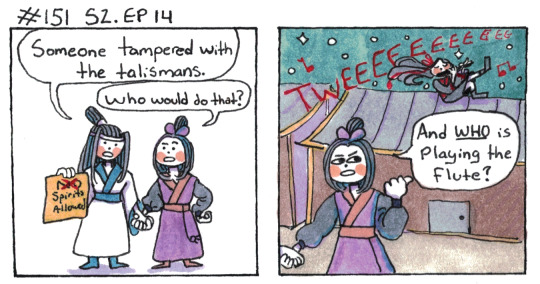
Unsolved Mysteries.
[First] Prev <–-> Next
#poorly drawn mdzs#mdzs#lan wangji#jiang cheng#wei wuxian#Spoilers: It was Wei Wuxian the whole time!#Once again this one was on the chopping block but I saved it for just a better comic flow.#Admittedly I do have a critique of the pacing here. Namely that we really should have ended the flashback when WWX fell.#And then gone back to present time for a bit - or even go to a different flashback.#The sense of time passing isn't as strong as it *could* be.#We get *told* three months pass and that they've been looking for WWX. But to the audience it's been...15 min.#Less than seven minutes if you count the flute playing.#This guy when through a whole aesthetic and persona shift in less time than it takes to walk through a corn field.#Guy who listened to less than half an emo album and dyed all his clothes black. And jorted all his jeans.#Timeskips can be sudden and work out just fine! I personally feel like this one would be stronger with better pacing.#Feel free to disagree with me!#In case anyone is wondering why JC and LWJ are still holding hands: 1) Haunted house episode.#2) I needed to practice drawing hand holding at some point. Might as well get the rough and sloppy ones out with these two.
761 notes
·
View notes
Text
the amazing devil had no right writing the lines "i wish i'd done things different, i wish that i'd been brave" and singing them with their angelic voices while the soft music is playing because they make me sob every fucking time
#i can count on one hand the times i didn't cry while listening to “ruin”#listening to it while feeling down is probably the reason but still#“tomorrow i'll do things different tomorrow i'll be brave” and then tomorrow never comes and i'm stuck in the neverending cycle#the amazing devil#joey batey#madeline hyland#tad#whining for the sake of whining#personal
470 notes
·
View notes
Text
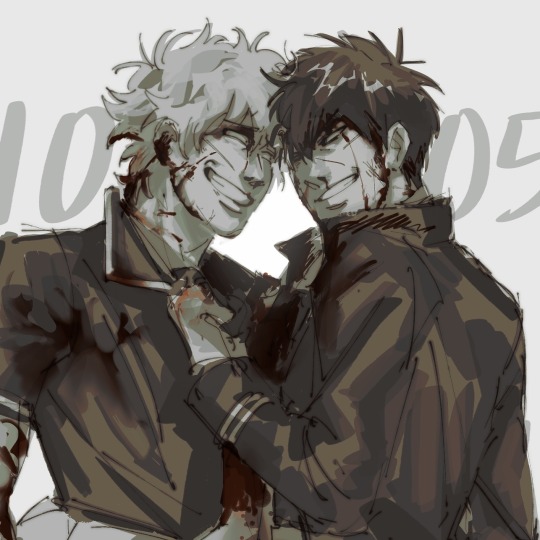
HAPPY GINHIJI DAY WOOOOOO
#listen its still the 5th here it counts OKAY IT DOES#I tried drawing hijikata’s ss outfit bc i really like it but hhhhh you can barely tell…….its fine#they’re at their best when they’re deranged together ❤️#got me in a chokehold fr#sakata gintoki#hijikata toushirou#gintoki x hijikata#hijikata x gintoki#ginhiji#hijigin#gintama#ok bye
513 notes
·
View notes
Text
do u ever get kind of weirdly emotional thinking abt how frankensteins monster as originally characterized in the book is so defined by his loneliness and misery and now literal centuries later not only does his story persist in the cultural consciousness but there have been like tons and tons of adaptations and various takes on the character that are basically like but what if they were happy and had a bunch of spooky best friends and family that love them :)
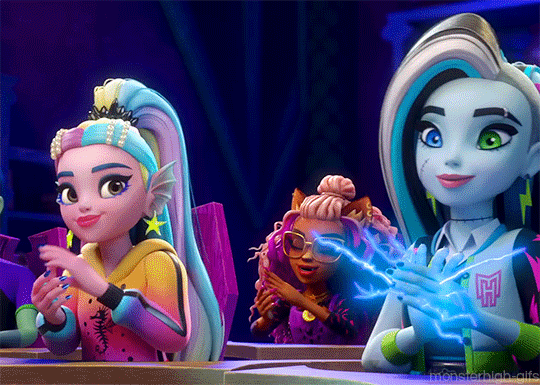
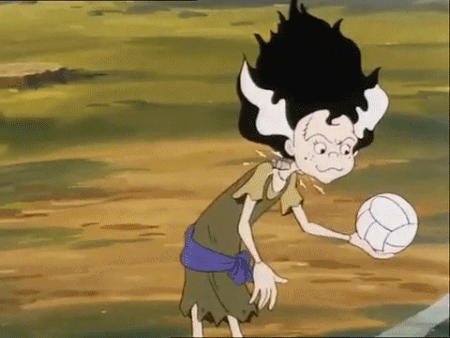
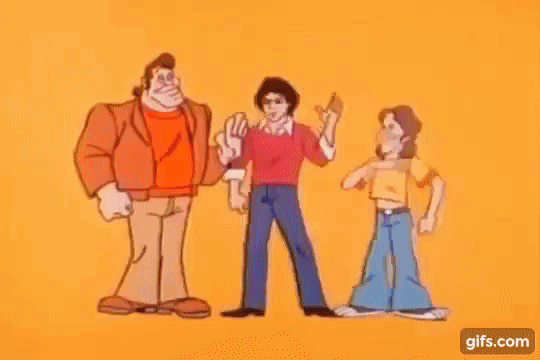
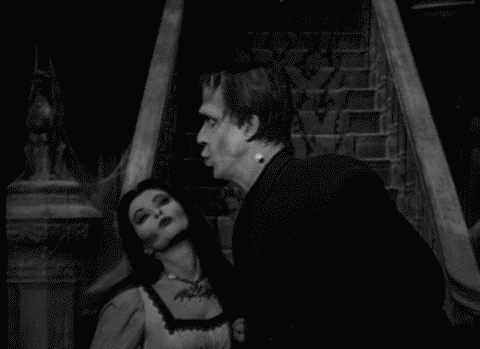
#gif#flashing gif#ungodly screeching#frankenstein#i know multiple of these are canonically the children of the original but they are still inspired by the og character so imo it counts#i know im overthinking/adding meaning that was probably not intentional but listen#WHST IF THEY WRRE LOVED
303 notes
·
View notes
Text
thirdyear!izuku would be the type of guy to sneak into your dorm, and (demand) ask if you can sneak out with him. he'd take you floating above the buildings, beyond it, and he'd trap you in his arms until you force him to return to the dorms---just so neither of you will get caught---he'd follow you (because entirely, he's still izuku, and izuku will always follow through what he's told), open your dorm window, sleep on your bed until someone knocks, telling you how late it is, that you've missed the first period and and and—
#pax speaks—!#let me cook#no but listen#i have a thing for confident!izuku#like thats so ooc#but... in-character at the same time#ESPECIALLY in his third-year#bc if katsuki developed as a character (more neutrally; he's still angry but not like over-angrily-competitive)#THEN IZUKU CAN DEVELOP MORE TOO (he needs to trust himself more he needs to STOP counting his worth i want to knock some sense into him)#izuku midoriya x reader#izuku midoriya imagine#deku x reader#deku imagine#izuku midoriya
271 notes
·
View notes
Text

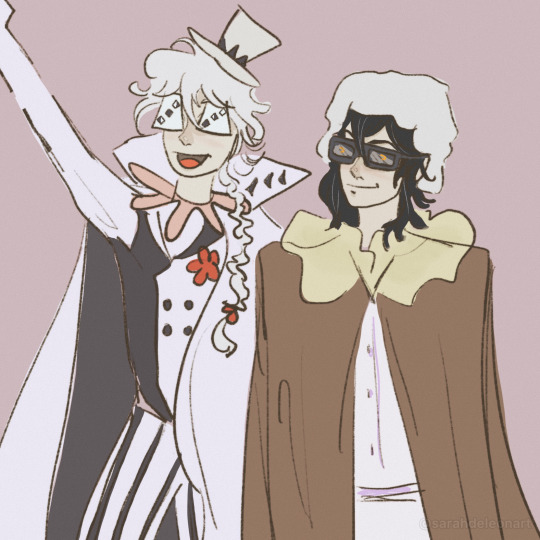
how many eclipses do you think Fyodor has seen in his lifetime(s)?🌒💕🥰
#tbh Fyo’s immortal-ish eyes can PROB handle the power of the sun#but he just looks so cool in his eclipse solar glasses teeheee😎💕#and he of course made sure Nikolai’s eyes stayed safe !!!#two cards for the eyes🃏🃏 better than just one☀️#it’s the thought that counts#meant to post this yesterday but the eclipse festivities & excitement are still ongoing in my book🥰✨#LISTEn I have sooo much ch 114 art I’m behind on posting on here👹👹#but SOON🫰(had to get my eclipse boys in first😘🌝)#fyodor#fyodor dostoevsky#fyodor fanart#fyodor dostoyevsky bsd#nikolai gogol#bsd nikolai#nikolai fanart#fyolai#fyolai fanart#fanart#bsd#bsd fanart#bungou stray dogs#bungou stray dogs fanart#bungo stray dogs#bungo stray dogs fanart#artists on tumblr#art#anime#eclipse#total eclipse#solar eclipse
66 notes
·
View notes
Text
i say this with love. house fanfic writers, if you ever want me to beta something for medical accuracy, i'll fucking do it no questions asked
#hate crimes md#house md#hilson#listen. every medstudent is some version of an idiot and i am only a second year so for the love of god do not ask me#for Actual medical advice that i am not qualifed to give. i'm just qualified enough to check Fanfic. and i'll do it too just ask#this isn't directed at everyone. some of you have managed to put together well-researched compelling cases and i am kissing you#on the mouth for it mwah. even as i don't actually give a toss about most internal medicine#(look. i am just in a very monogamous relationship with trauma surgery)#anyway don't rely on the show either - sure it's one of the more accurate medical dramas but these morons still shock asystole#you can ask me how medschool works too!! the show is house md not house getting his md yet i've lost count of the ridiculous ways#people have gotten medschool wrong just. mentioned in passing. so concise and yet so wrong#serious offer.#these inaccuracies bug me more than they should
77 notes
·
View notes
Text
day 7

what is bro yapping about
#ITS 4AM . THIS STILL COUNTS AS SATURDAYS. WHOOPS#i think ribbon rambles on and on about whatever she likes and ado just listens#they can take over the world i dont care i trust them#adeleine kirby#adeleine#kirby series#ribbon kirby#day 7#tw bright colors#tw eyestrain
125 notes
·
View notes
Text

When you first see Sakusa, it’s at a regular coffee shop.
He stands tall, intimidatingly towering over other people as he reads the menu with a disgruntled expression. You take notice of him while you wait for your usual drink, and you can tell you’re going to think about the attractive stranger at your favorite coffee shop for weeks.
His mask conceals most of his face, but his eyes catch your attention. The striking pools of onyx scan the menu rapidly as he seems to lose patience, his frown growing more by the second.
You don’t stare at him for longer than five minutes, knowing that you wouldn’t be able to overcome the embarrassment of being caught. But the outline of his figure burns in your mind as you turn to follow the worker who’s making your drink, a Mari who you’ve befriended during the frequent visits to this shop.
You think about whether he’s just having a bad day or if he’s always like this, whether he’s going to order from here or not, whether he’s ordering for just himself or others as well— friends or a girlfriend. Or someone he just likes, no tags.
You don’t hear the sound of someone approaching you over the sound of your own thoughts; in fact, you don’t even notice his presence over your shoulder until he clears his throat.
Turning to face him, you feel caught. Your cheeks warm in embarrassment, as if he could hear all the obsessive thoughts you were having about him. He stares at you blankly, and you realize his eyes are not only nicer up close, but also sharper. Being close to him also allows you to take notice of his other features— like his moles, the curve of his eyebrows, his cupid’s bow.
He leans down to your level, still keeping a safe distance like you’re carrying an infectious disease. Must be a germaphobe, you think. Getting the hint, you turn your ear to him.
“Do they add nuts to every drink on the menu?”
His voice is pleasantly deep and the whisper-tone makes him insanely attractive to you, but he asks the question with such genuine distress that you have to suppress a giggle. You turn your head back slightly to face him with a smile.
“Yeah, they’re big on the nuts thing. If you’re not a fan, you can ask them to not add nuts to your order, that’s what I do.”
He nods, still seemingly unsure, and you reflexively continue talking.
“But the coffee is really good, trust me, it makes up for the nut craze.” He stares at you with a blank expression, “trust you?”
You pale slightly, feeling like you’ve overstepped with the friendliness. But thankfully, Mari comes up to the counter, chiming in with your drink. “Here’s your usual,” she chirps as she hands you the straw.
You smile thankfully at her and she gives you a questioning look as her eyes shift between you and the tall stranger. She smiles slyly at you and you ignore her as you grab your cup.
“Well, uh, it’s up to you really.” You turn to him one more time, “You’d be the one missing out after all.”
And then you’re out the door as fast as you can. When Mari calls you that night, she’s disappointed to say the least, but she provides you with crucial information: he ended up asking for whatever you had.
The second time you see him, it’s on the court.
You learn that the guy you crushed on in a coffee shop is actually the outside hitter for MSBY Black Jackals, Sakusa Kiyoomi. Mari, who sits next to you during the game, nearly screams when she recognizes him.
She jokes about how you could’ve asked for his autograph or became a micro celebrity by dating him if you had a single romantic bone in your body; you tell her you have plenty of romantic bones in your body but he was just too intimidating.
The teasing goes on throughout the game as you both continue to be completely oblivious to the volleyball game around you. The tickets to this game weren’t cheap, and if Mari didn’t beg you to accompany her because her cousin plays for one of the teams and bought her tickets, you would’ve never found yourself seated at the front row of a volleyball game.
Granted, it’s one of the least violent sports and it’s entertaining to watch for a while. But you just couldn’t be any less interested in adult men throwing a ball around.
This game, however, seems to be much more interesting to you. Whether that’s because Sakusa is unreasonably gorgeous on court, or because Mari makes really entertaining comments on the game, you couldn’t really be sure. But watching Sakusa play was a life altering experience, you’d think about him in those shorts for months to come.
Your eyes follow him the whole time; you take notice of all his physical assets and find yourself giggling like a schoolgirl with Mari about all the athletes’ physical builds by the end of the game. She teases you about having a favorite and you can’t find anything to say in denial.
When the game ends, you’re almost disappointed that you can’t watch Sakusa in action anymore.
Later, when you’re standing outside the huge stadium as Mari talks to her cousin, you spot Sakusa’s team celebrating their win, circulating around him like a tornado. He stands in the middle of the chaos rigidly, and his ability to not crack a single smile around such cheery people astonishes you. You smile to yourself at the thought of how practice goes for the team if this is how it was when they won.
While MSBY’s blond setter (you were too focused on Sakusa during the game to catch anybody else's name) is aggressively throwing an arm around him, speaking loudly over the others, his eyes fleetingly meet yours. Your throat constricts at the brief eye contact and you reflexively stand up straight. When his teammate has moved on from annoying him, he looks back at you, and this time, the stare lingers.
He’s so intimidating and yet so breathtaking to you— standing in the middle of his friends, he seems to stick out like a sore thumb. You wonder if there’s any emotion behind his stare, if he’s judging you or if he thinks that you’re hideous and that you coming to his game is an insult— or if he finds you pretty and intriguing the way you do him.
You wonder about his dating history and his type of woman.
Before you’re too far gone in the land of delusion, Mari is back with a wide grin and mischief written all over her face.
“You should really talk to mr.loverboy at one point. I’d like to attend a wedding once in my life.”
You laugh at her as you both walk to your car. Turns out both of you are already too far gone in the land of delusion.
The third time you see him, you’re not doing too well.
The walls of Onigiri Miya are terribly familiar to you because you find yourself in the same spot every few weeks. In your mid-twenties, you’ve discovered that one of the few things that lighten the burden of existence is food— good food, something that the gracious Osamu Miya always offers at his shop.
While the world constricts around you, the place offers you the kind of comfort that only a warm meal could. Your stomach is full even if your heart feels empty, and that makes you feel a bit better.
Your monthly breakdowns at the onigiri restaurant aren’t new to you.
What you didn’t plan for, however, is the unfamiliar voice that calls your name.
You push your head off the table with a grunt to look at the caller and you’re, once more, facing the beautiful stranger that you stumbled across in a coffee shop— Sakusa Kiyoomi.
His eyes widen slightly at your face and you suddenly feel self-conscious, you don’t particularly look your best on a night like this. Out of all the times to actually meet him. The surprise on your face must have offended him because his expression reverts to his usual frown.
He stands rigidly with his hands in the pockets of his coat. His mask is pulled down for a change and you finally see the rest of his face at a closer distance; if you weren’t in emotional shambles, you’d be much more thrilled right now.
His frown is heavy as he looks at you, almost like frowning helps him think.
But before either of you have the time to think, the blond setter from the game you went to barges in on your moment and casually swings an arm around Sakusa’s shoulder. Sakusa shoots him a deathly glare but he doesn’t waver. Must be pretty good friends, you think.
“Hey omi-kun, who’s your little friend?” he asks, eyeing you with growing interest, a crooked grin on his face.
“She’s not my friend miya, get your arm off my shoulder.” Sakusa grumbles as he attempts to shake the blond’s arm off, but it stays planted on his shoulder firmly as they begin to bicker like an old married couple. Yeah, definitely good friends, you smile to yourself despite the gloomy cloud hanging over your head.
You realize that the guy Sakusa not-so-affectionately called Miya looked similar to Osamu, and you vaguely remember Osamu mentioning a brother before— a twin to be exact. The puzzle pieces come together and you’re amazed at the way fate connects people. The restaurant you visit frequently is owned by the twin brother of Sakusa’s teammate.
How many times did you come close to meeting?
Osamu comes out of the kitchen and the bickering evolves into sibling arguments as you zone out in the corner. The familial scene with Sakusa in the middle makes you bite back a smile, who thought that something so silly could be so entertaining? And entertaining enough to distract you from the things weighing you down.
The blond twin suddenly turns to you and you instinctively flinch, realizing you’re about to become part of the conversation unwillingly.
“Are we annoying you, doll?” he asks.
You hesitantly shake your head and the blond jumps to grab a paper bag out of Osamu’s hands, “See?” Osamu gives him a blank look, “you literally pressured her.”
“Did not. Now come on Omi-kun, we’ve got places to be. Everyone must be starving.” You turn to look at Sakusa (Omi-kun, as you know him now), only just realizing that he’s standing closer to you than before.
He gives the blond a stare that you’re oblivious to, and they share a moment of silent communication. Osamu looks between them and momentarily at you, seeming to understand something you don’t.
The blond twin, whose name you still haven’t discovered , slowly smirks at you with recognition. “Oh yes, I’ll go ahead. Don’t take too long now Omi.”
Then he’s out of the door, and Osamu retires to the kitchen with a knowing smile. You wonder what secret they were sharing in front of you.
Now that it’s just you and Sakusa in a nearly empty restaurant so late at night, the realness of the situation hits you like a cold gust of wind. You slowly turn your face towards him only to find him already looking at you.
Unsurely, you smile politely at him. He doesn’t return it, but he doesn’t seem like the kind to anyways. Instead, he drags the chair across from you back and plops down in front of you. The fact that you’re sitting across from the mysterious attractive guy you saw in that coffee shop is surreal.
His face finally relaxes and you notice how much prettier he looks when he’s not frowning. In this state, you don’t find it in yourself to look away from him. The dim lights of the shop illuminate his face and he’s almost god-like with his pushy brows and sharp eyes.
He seems okay with the attention you’re giving him, and you’re not sure if it’s the midnight paranoia but you swear his cheeks go pink at one point.
You’re too engrossed in admiring his physical features to notice how he hesitates to talk.
“You’re.. are.. are you okay?” His question brings you out of your lavender haze and you don’t process the question at first.
“Am I okay?” you retort in confusion.
He nods reluctantly.
Your hand comes up to cup your cheek when you realize that they’re wet, and suddenly you realize what he’s asking about. Your cheeks grow hot in embarrassment.
“Oh yeah yeah, I’m fine. Or I will be.” That explains why he was surprised when you lifted your head.
He observes you with interest and it’s your turn to feel embarrassed at the attention.
The intimacy of the scene isn’t lost on you. You sit like old lovers who never fell out of love, admiring each other in a public place that feels like it only contains the two of you. You sit together like you’ve known each other for years. You want to salvage the intimacy of the moment but a burning question comes to the front of your mind.
“How’d you know my name?”
He blinks at you, seemingly confused by the question.
“When you got here, you called out to me.” You continue unsurely. “We’ve never spoken before, how do you know my name?”
He blinks at you again as the gears in his head turn. When he realizes that he did in fact call out your name despite never asking you about it, the tips of his ears turn red. You observe the changes in his face with a slowly growing smile; you’ve noticed something he hoped you wouldn’t.
“It was on the cup. Caught it when you were leaving.”
The cup. The cup of coffee you ordered at the coffee shop you first met at. When you ran away from him. You raise your eyebrows in amusement, how did he manage to catch that? Moreover, how did he manage to remember it for weeks when you’d barely talked.
The thought of Sakusa having an interest in you since the first meeting makes you feel like a teenager getting asked out for the first time.
You look at him across the table, observing his face and everything you’ve grown to like about it. Suddenly, you think about meeting him like this more often, about getting to see him much closer than this, about being the kind of woman he’d date, and about tracing his lips with something other than your eyes.
When you notice his eyes traveling across your face, you wonder if he possesses any similar thoughts, any burning urges to reach across and touch you and set off the reaction that's been brewing for weeks.
It's so close you can almost taste it.
You lock eyes and you slowly realize that neither of you are ready to jump straight into anything. He's as hesitant as you are, maybe even more. But, if you've got to start somewhere, you know exactly where to take him.
“Sakusa," you start, already smiling, “would you like to get coffee with me sometime?"

#sakusa you are so HARD to write for#but youre so bewitching i just cant resists#now listen. i didnt edit this as much as id like to because i could feel myself slowly giving up on it#i needed it out before it was scraped for good#before it just made me give up on being a writer#so im posting it in its not so final form with the hope of coming back to edit it at one point#i still loved the idea enough to keep writing it#i mean...#word count : 2.5k#inspired by all the artists who draw sakusa like he's the definition of beauty#haikyuu sakusa#sakusa kiyoomi#sakusa x reader#sakusa fluff#sakusa scenarios#haikyuu x reader#haikyuu!!
700 notes
·
View notes
Text
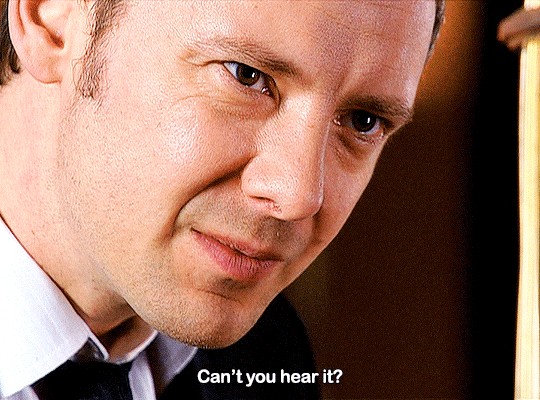


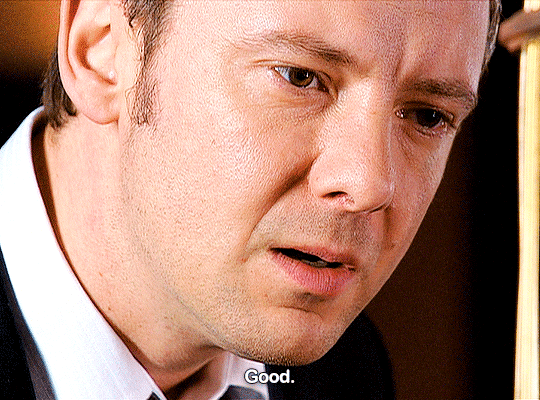
We're opening up a rift in the Braccatolian space. Won't see us coming. Kind of scary. Then stop. Once the Empire is established, and there's a new Gallifrey in the heavens, maybe then it stops... the drumming, the never ending drumbeat. Ever since I was a child, I looked into the Vortex — that's when it chose me. The drumming, the call to war. Can't you hear it?
#tenth doctor#simm!master#doctor x master#dwedit#dw#*#i was gonna strategically crop lil guy out of that 3rd gif but you know what? i'm not a coward.#woe lil guy and his tiny custom-made pinstripe suit be upon ye#ANYWAY. why did the master say ''good'' here. hello. i'm rattling the bars of my fuckign cage why did he say that#is he glad the doctor is spared from it??????#also the doctor like. not listening. at all. not even trying to listen apparently#since all it took was one lil forced contact in eot#still giving him an absolute for an answer. ''it's only you.''#all the shit ten says throughout this oh we're the only ones left it's the two of us blah blah blah. but where it counts? IT'S ONLY YOU.#see obv i'm master biased but all this shit makes me crazy abt the stuff 12 said to missy. ''you never learned to hear the music''#bro you NEVER LISTENED to him. you're still not listening to her!!!!!#araghghagh. ok.
155 notes
·
View notes
Text
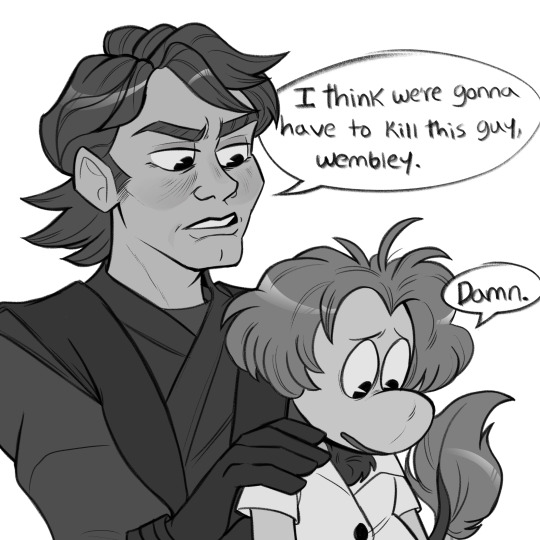
[The Imperial March motif plays softly in the background]
♡Taglist♡: @me-myself-and-my-fos @tiny-cloud-of-flowers @sunstar-of-the-north @dearly-beeloved @changeling-selfship @little-miss-selfships @silverhardt @bob-in-tekken-8
#artfarts#not self insert#idk does it count when ur ship isnt ACTUALLY in it but ur f/os are?? 😂😂#star wars#star wars the clone wars#anakin skywalker#tcw anakin#fraggle rock#jim henson#wembley fraggle#🔥 general hothead 🔥#cc: wembley fraggle 💚#ajjmmg anyway i dropped EVERYTHING to draw this#for context ive seen a couple people redraw a particular meme with their two comfort characters#and after a discussion w my partner about what i consider a comfort character i came up with this 😂😂😂#i consider cc different from f/o for a few different reasons#wembley is obvious and though anakin is a platonic f/o hes still a cc bcs i love him#AND OUGH DID THIS MAKE ME MISS STAR WARS 😭😭😭#while i was looking at ref pics omega's theme came on shuffle and i was just listening and looking at anakin....#i love him so much. i love star wars#i gotta go back to that soon x3
125 notes
·
View notes
Text
Mario dreaming about Peach in Super Mario Odyssey: a comprehensive version because the only other version I've seen left out the three "amore" clips and those are arguably the best ones
#in relation to that post I made yesterday#super mario bros#smb#super mario odyssey#smo#princess peach#audio#these are of course interspersed among mario reciting the names of various pasta dishes in his sleep#the last one is probably meant to be 'pici' but it's still cute and the other one has him giggling at how similar it sounds to 'peachy'#so I counted it!#highly recommend just downloading all of his voice clips from sounds resource and listening to them all#there's like fifteen different clips of just snoring sounds. peak asmr#mario x peach#mareach
56 notes
·
View notes
Text
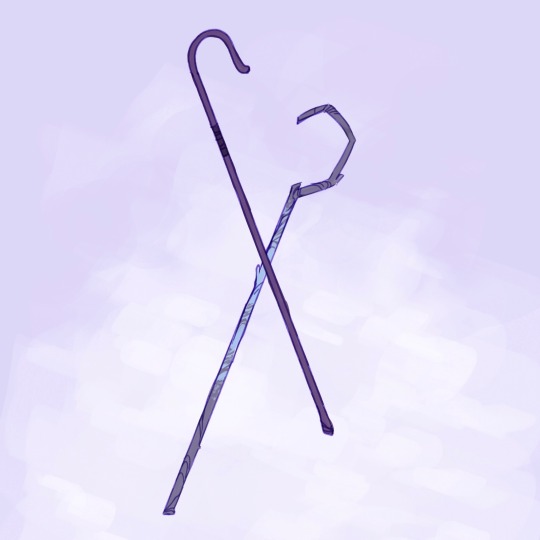
“You’re an idiot,” Jack told him. It was one of the first phrases he learned in Norse, and it was easier to say than I love you.
#fic playlist to keep me motivated!#it’s still very much in its early stages#translations au#mine#frostcup#listening to music that makes me go hmm counts as working on my wip right#fic: translations
193 notes
·
View notes
Text

let's go my love, we don't belong here anymore...
#THIS HURTTTTTTTT#when i say i wanna cry...#why internet why?#im feeling very miserable rn#after i counted both twitter and tumblr votes i wanted to punch myself for giving u this option#pls dont make the same mistake and dont listen to sad music#its just a bad dream because they are still happy and alive in jackson#its one of joels nightmares#tess always comforts him afterwards#she hugs him so close joel's not sure if he's still breathing#he tells her about the nightmare so tess lets him listen to their hearts steadily beating in their chests as a proof that they are alright#because they are#and it was just a bad dream#tess servopoulos#joel miller#joel x tess#tessjoel#tess tlou#joel tlou#tess lives
85 notes
·
View notes
Text
Before the semester kicks off and murders me, @disniq asked for my essay on Jason Todd and hysteria. So, without further ado, here is an actual essay (fucking dissertation) because I refuse brevity. It is extremely long. I’ve split it into sections so you can find the section header and read what you want. This does not encompass all the narrative trauma themes and lived experiences that this boy holds, just specifically hysteria.
Jason Todd, The Hysteric & Bruce Wayne, The Batman
I think it’s a common reading that Jason Todd is girl-coded and the patron saint of victims, at least within the circle that I’ve fallen into within this fandom. There are plenty of meta discussions on why those readings stand, so I’m not going to reiterate them. A pillar of him being girl-coded and someone trauma survivors have latched onto as one of our own has to do with being written in the context of hysterical femininity. And let me just say, I don’t think that writing was done in a way that he was intentionally coded as hysterical, but it is a function of our patriarchal society that this coding was used on him albeit without the explicit purpose of writing a hysteric story.
For the purpose of this post: the word woman includes ciswomen, transwomen, and any person who is socially positioned as a woman regardless of gender identity. I include the positionality here because anyone can experience misogyny and sexism depending on the perception of the perpetrators either interpersonally or systemically.
The History and Context of Hysteria
To understand the context, we have to look at the history and oppression of hysteria. Hysteria (in the modern context of psychology) emerged in the nineteenth century and is difficult to define by design and often applied to traumatized, unruly, and broken women. The main patriarchs who contributed to hysterical study were Jean-Martin Charcot and Sigmund Freud. I only mention this because it’s important to know their names moving forward for any of this to make sense. The beginning of this started with Charcot literally putting women whose lives had been marked by rape, abuse, exploitation, and poverty on display in his Tuesday lectures (which were open to the public) to show his findings on hysteria. This was actually seen as restoring dignity (fucking yikes) to the women because before Charcot these hysterical women were cast aside and not treated at all. In Charcot’s work, the women’s speech was seen as simply “vocalization” and their inner lives, their stories, their words, were silenced. After hearing a woman cry for her mother during one of the public sessions Charcot remarked, “Again, note these screams. You could say it’s a lot of noise over nothing” (Herman).
This led to Freud, Charcot’s student, wanting to surpass his teacher by discovering the cause of hysteria. This was disastrous. Freud started with listening to the hysterics. In doing so, he learned and believed them about the abuse, rape, and exploitation of their pasts. He then published his work and gave a lecture on it. The work rivals even contemporary psychological work on trauma in it’s level of compassion, understanding, and treatment of survivors. However, he was then labeled a feminist (this was all happening during the first wave of feminism) and professionally ostracized. How in the world could these aristocratic French men be sexually abusing their wives, sisters, and daughters??? Insanity, truly. And... This always fucking gets me. He recanted his work and then told his patients they all imagined it because they wanted to be sexually abused by their husbands, brothers, and fathers. This set back the study of trauma by literally a century. One colleague called his work “a scientific fairy-tale” simply because he had the audacity to believe victims. Also, I want to point out that the famous hysteria case during this time was the case of Anna O and she was ultimately villainized by the entire psychological community for going into crisis after her care provider abruptly ended their therapeutic relationship after two years of DAILY sessions.
Anyway. We can see how the power of these men over vulnerable women silenced, pathologized, villainized, infantilized, and used male ‘logic’ to completely destroy their credibility and lives under the guise of care and hysteria. Even when credible men lend their expertise and voices to the victims, their voices are silenced. This particular iteration of hysteria lasted over a century, and we are still dealing with the consequences of these actions and ideas within our social construction, medical and mental health care, interpersonal relationships, and more. Patriarchal pillars such as hysteria don’t die. We saw it move from hysteria to schizophrenia (which used to have the same symptoms of hysteria before the diagnosis changed in more contemporary psychology) after this which led to widespread lobotomies and electroshock therapy (my least favorite case of a lobotomy being done is on a woman who was diagnosed with LITERALLY ‘narcissist husband’) to depression in the 40s-50s with the over prescription of benzodiazepines to house wives to keep them in a zombie state (these prescriptions were sometimes double and triple what we take today with the intent of medical catatonia). In my opinion, as well as other counselors within the feminist therapy theoretical orientation, we are currently seeing it with the emergence of borderline-personality disorder. Think about how BPD is treated and demonized for a second. I professionally know therapists who refuse to work with BPD clients due to this villainization and just fucking gross perception of victims.
These are just the highlights, but it shows the history of hysteria. There have been centuries of women being marked as hysterical and the cures have ranged from lobotomy to bed rest (which sounds not so bad but read the Yellow Wallpaper and get back to me on that one). While the Yellow Wallpaper is fictional, the life behind it was not. After the traumatic birth of her child the author, Charlotte Perkins Gilman, was remanded to bed rest by the authority of her husband and doctor. Within the sphere of medical control, hysterical women are often treated as children while their doctors make decisions for their mental well-being without consulting them, or they hide the truth of their procedures for “the woman’s own good” and because “she’s hysterical and wouldn’t comprehend the logical need for this.” She then had a mental break due to the treatment. Again, we see hysterical women being silenced, infantilized, discredited from their own experiences, and under the narrative control of male logic and voices.
Hysterical women have often historically been seen as beneath men, except for when they’re dangerous. Listening to victims is inherently threatening to the status quo because all trauma comes from a systemic framework. The framework that upholds patriarchal power. It’s easy to see why that would be seen as dangerous to powerful men. We saw this with the European witch genocide in which oppressed women were targeted and wiped out under the excuse of what was considered women’s work. (Before this time, witchcraft wasn’t tied to any religion and was mostly just seen as women’s work. It was targeted specifically to have an excuse to persecute widows, homeless, disabled, and vulnerable women who no longer had men to reign over them during a time of political unrest and scarce resources). This time period saw hysterical and traumatized women demonized as dangerous, evil, immoral, hypersexual, and supernaturally wily. A threat to the moral fabric of society.
(Interesting history side note: this caused the view of women’s base traits we have today. It stemmed from the Victorian era that came after this time period in which women learned if they behaved a certain way, they would be spared the stake. For example, before the witch trials, women were actually seen as the ones with unsatiable sexual appetites, something we culturally prescribe to men now.)
Notice how none of this has to do with the actual abuse that happens to the women, but instead the labeling and treatment of women when they are already showing the symptoms of abuse, trauma, control, exploitation, and rape.
Jason Todd, The Hysteric
So, how does this relate to Jason Todd? To say that Jason has experienced trauma would be an understatement. Extreme poverty, loss of parent to death and addiction, loss of parent to the justice system, parental abuse, manipulation, witnessing violent crimes, witnessing the aftermath of sexual abuse and assault, arguably (not explicit in the text) his own sexual trauma, witnessing the dead bodies of victims, a violent death, and subsequently a violent resurrection. There’s also an argument to be made for being a child soldier and how that is romanticized up until he dies, but the text does not treat this as traumatizing.
Now, I’m not going to dive into the trauma he experienced. The purpose of this is only to look at how he’s framed as hysterical in the narrative, and as I stated, hysteria was a word slapped on women after they tried to talk about their trauma or exhibited symptoms (or were just unruly women). Jason does embody many facets of the victim experience and this is just one of them.
Feelings vs “logic” - Firstly, it is really hard to talk calmly about things that you carry, your experiences, your trauma, and things that specifically harm you. It is easy to talk calmly about things that don’t. This is why there is an abuse tactic of gaslighting or silencing victims by framing their very real reactions to harm or their triggers as abuse, this is known as “reactive abuse.” This tactic is also employed in oppressive settings where the privileged group will often default to ‘winning’ a debate by being able to remain calm while the marginalized group whose life, personhood, etc is being harmed by the things being discussed and are unable to have a sterilized, emotionless debate.
Both of these settings fit Jason nicely within the moral context of vigilante comics. He fought back, he didn’t lay down, and he will do what he deems as necessary to protect himself and others from his fate. This, however, is framed by Bruce and others as being just as bad as his murderer or even just as bad as Joe fucking Chill. To put this in perspective of a real world equivalent. Combine every billionaire on this planet into one person and instead of their shitty business practices murdering people, they did it with their own two hands. And due to their resources and political power, they would never, ever stop killing or be reasonably contained. More people would die with absolute 100% certainty. Would killing that one person make you equally bad as that person or violating the sanctity of life? That’s the moral question that Bruce puts onto Jason. While the moral question inherent to Jason is actually, is there a line worth crossing to provide reasonable safety (for yourself or the nameless community)? There is actually a difference between those two questions and the reactive abuse framing is certainly a choice. Also, it is funny to me that a man with the amount of power Bruce has (and frequently misuses) can lecture a murder victim on the misuse of power and morality. Are we supposed to be agree with his stoic, philosophical lecturing to a marginalized, abused, murder victim? (yes, we are). Bruce leverages (personal) philosophy against victim’s voice for their own safety, and take a wild guess which one is framed as logical and reasonable.
Jason’s morals come secondary to Bruce’s philosophy in a universe where there is still harm being done (but it’s an acceptable harm). Why is killing the line? Bruce is regularly destroying families and lives by feeding them into the prison industrial complex while supporting it with his whole chest. Or he’s disabling and seriously maiming people with the level of violence he uses.
Crying - Throughout the entire story of Under the Red Hood, we never once see Bruce emote while interacting with Jason outside of tight grimaces. With the exception of the shock he shows at the Joker’s life being threatened, which... Okay, suuure. We never see him cry during any of their interactions, but we do see Jason cry. Specifically, we see him crying when he’s at his most emotionally vulnerable and physically dangerous to the toxic male power fantasy. This kind of vulnerability is rarely shown by male characters, and when it is, it’s usually done with a mist of a tear in their eyes or their face is hidden. There are a few narrative devices that allow men to cry, but they are the exception rather than the rule. Usually, it’s to play for laughs, infantilize, or emasculate. Here, we see Jason combine the violence of a bad victim, bucking the system of power, and fully crying. Just slide right into that hysterical coding like a glove. Jason often shows his feelings entirely. Time and time again, the readers have seen Jason have breakdowns, cry, and be overcome with grief. This is tied to his portrayal as hysterical and unstable in the narrative, but in actuality it shows his capacity for love and how vastly impactful his death was.

This fits nicely with the next point that Jason fits into the hysterical box. Love is framed as one of his key faults. A son reaching for his father.

Love - One of Jason’s defining features is the amount of love and compassion he holds. He’s willing to put up with any treatment, shoulder blame, and sacrifice himself for others to almost an unhealthy degree. However, this doesn’t extend to what he defines as his baseline safety. This one line of safety is the one thing that can’t be crossed, even with all of the love he feels for his father. He desperately wants to feel connection, have a family, and be loved in return with the same unwavering ferocity love that he gives. This is such a fucking key part of the victim experience, especially victims of childhood trauma. The desperation to just be chosen. He’s raw and honest with his reasonable expectation for love to provide safety for him and that is framed as hysterical, needy, unstable, naive, and fucking childish. Victims know what they need to have safety, and this framing as Bruce knowing what’s best for Jason and literally giving a cold shoulder to his needs is disgusting.
Less than - Jason is portrayed as less powerful than Bruce even though they have similar expertise. There are so many instances of this that if you just open any media they both appear in, you can close your eyes, point, and land on an example. It makes me die laughing every time I remember that the Arkham games made Jason just one inch shorter than Bruce. Like, they can’t even be the same fucking height, that’s the level of insecure masculinity surrounding this relationship. Jason cannot and will never be able to be on par with Bruce because of his hysterical femininity and the power of Bruce being the self insert for the toxic male power fantasy. This power dynamic applies to the other batkids as well, but specifically in Jason’s case there is an element of hysteria. The reasons change because he’s so inconsistently written but usually he can’t surpass or even meet a stalemate with Bruce because he’s too emotional, he’s unstable, traumatized, and simply Bad. It’s even explicitly stated by Alfred in Under the Red Hood.
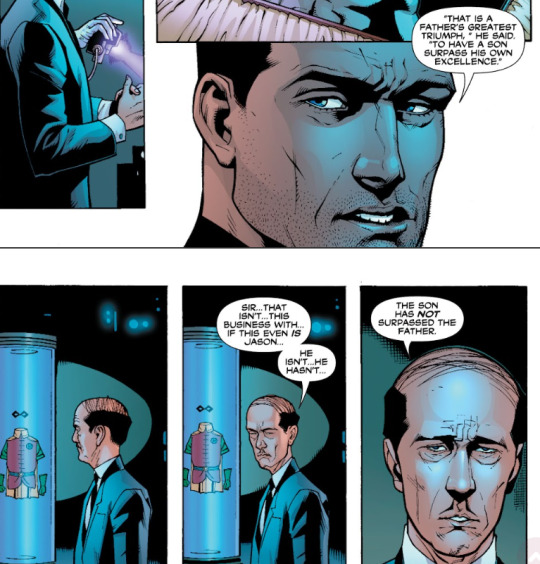
Victim blaming - Jason deserved to die because he didn’t follow orders. Jason deserved to die for not following his training. Jason deserved to die because he was an angry Robin (oh no a child had an appropriate reaction to sexual violence). Jason deserved to die for being human.
Infantilization - Jason is repeatedly infantilized in contrast to Bruce. When given the ultimatum at the end of UtRH, Bruce speaks to Jason like a child, or a bad dog. Ordering him to do things like, “enough!” or “stop this now.” Bruce knows what’s best for Jason (and for everyone in the entire world), we should really just take his word for it and not the victim’s. Imagine staring at a 6 foot wall of a man and scolding him like a child. Beyond that, as mentioned above, his views of love and safety are framed as childish. Even though they are actually leaning more toward collectivism rather than the rampant individualism that Bruce so strongly defers to. (also, just a side note, collectivistic methods in healing from trauma is actually the only scientifically reliable way to heal. Every other method has absolutely abysmal results and higher rates of relapses.)
Silenced and Safety Villainized - Jason is silenced in his own story, acceptable and honored when he was dead and met with vitriol in life. All of the love given to him as Robin turns to ash as soon as he collides with Bruce’s power and morals. I think any survivor can relate to the experience of being told that what happened to them was a long time ago and it’s time to move on. Or even that they’re leveraging their own safety to get what they want in a manipulative way. Regardless of whether or not there was any accountability or justice for the harm done to them. Alfred asks Bruce if he should remove Jason’s memorial in the cave like two seconds after learning of his resurrection because Jason’s methods of securing safety for himself and using his own voice to define his story. Bruce was able to tell Jason’s story when he died. He was able to memorialize, grieve, and ultimately define Jason’s story because Jason wasn’t there to speak for himself. When Jason does speak for himself, he is villainized and literally stripped of his past significance as Robin (or a good victim) by Alfred within seconds. This is reflected in real life with adoptee advocates speaking about how adoption is unethical/harmful/traumatizing and subsequently being framed as ungrateful, selfish, etc. They were little perfect victims without voices before they grew up and could speak for themselves.
Erased - Gestures at the entirety of how Jason is either talked about or completely erased during the 90s Tim Robin run. He wasn’t convenient to talk about, as victims rarely are. This also ties into how Steph’s death was erased and Babs was written like she “won” at trauma by simply... beating it???
Dangerous - Jason is framed as threatening the basic fabric of society (in a story with vigilantes this is hard to do, so they have him oppose the no-kill rule, and then doubled down on Bruce’s characterization of no-killing). Anything that bucks the status-quo is usually marked as villainous in mainstream vigilante/superhero comics, but this is a step beyond that into the interpersonal and political sphere. Hysterical women are often framed as dangerous, villains, snakes, and treacherous (the other side of this coin is weak, pathetic, and pitiable) because they are victimized and then have the audacity to do something to the system about it. Whether that be the system of their immediate families or the political sphere. I don’t think it’s a coincidence that Jason was paired with Talia in Lost Days to hammer this point home to the reader. It could’ve just as easily been anyone with access to the Pit that rescued him, but no, we had DC’s favorite brown, treacherous, venomous, female punching bag.
Bruce Wayne, The Batman
Bruce fits well into the father, enforcer, and logical man slot in Jason’s hysterical story. There is a history of ownership throughout women’s history when it comes to their subjugation to men. Women actually couldn’t be put on trial before the witchcraft genocide because they weren’t seen as legally a person. Their male owner would be put on trial instead. Women would go from being owned by their fathers to their husbands after entering marriage, the most dangerous woman being one who isn’t owned (orphaned, widowed). Bruce does treat (and even thinks) about Jason like he’s something that he owns. He’s his protege, his son, and his responsibility.
The narrative function of Bruce as a perpetrator in Jason’s story.
“The perpetrator asks the bystander (reader) to do nothing. He appeals to the universal desire to see, hear, and speak no evil. The victim, on the contrary, asks the bystander (reader) to share the burden of pain. The victim demands action, engagement and remembering” (Herman).
Bruce does remember what happened to Jason. He keeps a permanent memorial to his dead son. However, this doesn’t translate into any kind of tangible action. He doesn’t do anything to actually stop the murderer who took his son’s life and he continues to throw child soldiers at the problem of crime (how many children have died for the sake of his no-kill rule at this point?). When met with the reality of his inaction, he fits into the perpetrator’s role like a glove:
“In order to escape accountability for his crimes, the perpetrator does everything in his power to promote forgetting. Secrecy and silence are the first line of defense... If secrecy fails, the perpetrator attacks the credibility of his victim. If he cannot silence her absolutely, he tries to make sure that no one listens... From the most blatant denial to the most sophisticated and elegant rationalization... One can expect to hear the same predictable apologies: it never happened; the victim exaggerates; the victim brought it upon herself; and in any case it’s time to forget the past and move on. The more powerful the perpetrator, the greater his prerogative to name and define reality, the more completely his arguments prevail” (Herman).
I think it is simply fact at this point that Bruce is the head patriarch in Gotham if not, arguably, in the entirety of DC. That level of power in the narrative cannot be ignored, especially when faced with the very real, screaming voice of a victim that Bruce uses all of that power to silence. Bruce, because of his status as patriarch, default protagonist, and self-insert for the toxic male power fantasy, has the ultimate power to name and define reality. Especially to the reader. Bruce doesn’t deny what happened to Jason, because that’s physically impossible to do. But what he does do is ensure that no one listens to Jason, discredits him, and rationalizes his own inaction, actions of violence towards Jason, and victim blames.
Here’s Bruce using the most base form of denial and victim blaming:
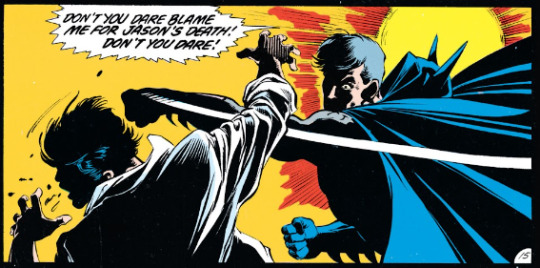

After this panel, Bruce also revokes Dick’s access to his childhood home simply for asking a question.
This theme extends to other members of the batfam because of Bruce’s narrative power over them. It’s why we can’t have Dick, Steph, Babs, or even Damian step in and relate to Jason’s trauma or vindicate him. Even when we, the readers, can see parallels and wonder why these conversations or bonds aren’t forming. Jason HAS to be a lone wolf because he is hysterical and a threat to the system of power. This also shows why most of his runs in group settings outside of the batfam fall apart or fall flat. If he was humanized by any other character or had his trauma validated in any actionable way, it would be recognizing the failure of the toxic male power fantasy. The readers are not supposed to see the flaw in this system that allows the bodies of children to pile up and sympathize with one of their voices. It would be a crack in the system of power that exists not only in the source material, but very much within our real world.
Side note: Jason is allowed to interact with others in a wholesome and validating way when he no longer threatens the systemic power of Bruce. When he is silenced by the writers and plays the “nice victim” (like Babs does), he is allowed connection. Only when his healing is done in a way that doesn’t demand action and is only his personal responsibility (gotta love the rampant individualism). If he is hysterical, demands action, and asks for someone to be held accountable for his death, he is shoved away into a lone wolf box. Examples: Gotham Knights (from my very basic understanding, I haven’t played the game, only seen play throughs) and WFA. Victims are acceptable if they do their healing in a neat little box and stay there, but hysterics are the ones who step outside of that box.
Red Hood, The Political Voice of Hysteria and Trauma
Red Hood is deeply political in terms of hysteria and trauma. Herman stated that victims and those that authentically care for them or listen to them intently (whether that be interpersonally, clinically, or professionally) are silenced, ostracized, and discredited. Survivors need a social context that supports the victim and that joins the victim and witness in a common alliance. On an interpersonal level this looks like family, friends, and loved ones. However, trauma is systemic and the social context mentioned above must also be given on a wider social scale. For this to be done, there had to be systemic change and political action. Jason had the interpersonal social support and witnesses to his trauma ripped from him by Bruce. So, we see him move onto a systemic level of addressing trauma in his own political way. He literally cannot escape Bruce and this constant trigger because of Bruce’s philosophy and just... fucking power to define reality... being re-enforced constantly in DC no matter where he tries to go. So, he tries to heal by taking the systemic issue of perpetrators who cannot be held accountable or have fallen through the cracks of accountability into his own hands in a very personal way. A one man political movement.
Whether his methods are moral or ethical doesn’t really matter in the overall framing him as hysteric. He simply has to be opposed by the male power fantasy in some significant way. This shows that the goals, needs, and work towards victim’s and the marginalized’s freedom is dangerous, doomed to fail, and ultimately unethical if the victim is framed in a villain light instead of the more pathetic/pitiable iteration of hysteria.
You can see how this is not only problematic but also reflects the real world values instilled in arguments against human rights movements (which are intrinsically tied to victims rights). Defunding the police is dangerous, the MeToo movement is dangerous, abolition is dangerous, trans rights are dangerous, etc etc etc. Think of the victims voices tied to each of these movements and how they are integral to the real change offered by these political movements. You can’t have human rights violations without creating victims. And you can’t have political movements surrounding human rights without listening to victims.
We can also see how the individuals within these movements are ostracized, villianized, and often silenced (sometimes ultimately silenced with death) because they rally against the systems of power that victimized them. The framing of traumatized, vulnerable people as hysterical is integral to upholding the system of power that traumatizes and harms them.
A popular comic book movie adaptation that highlights the importance of Jason’s hysterical framing and how it impacts the political narrative/how he is written is V for Vendetta. To be fair, it received an insane amount of backlash by conservatives (not within leftist or liberal spaces) for V’s methods in over throwing fascism, but only because of the movie’s release date being so close to 9/11. V and Jason have many parallels, it’s only the lack of hysterical framing that makes V more palatable to the viewer. We are told, not shown through behavior, that V is traumatized by his past and he does not pick a fight with the protagonist that functions as a toxic male power fantasy. He is the protag, with his version of Bruce being men who are not framed in a sympathetic, heroic, or relatable light.
Additionally, there is literally an unemoting mask standing between the viewer and V, whereas Jason takes off his helmet to allow the reader to see every aspect of his trauma and pain. V readily dehumanizes himself into an idea, rather than a person. Whereas Jason screams to be seen as a person in a very hysterical way. So, we can see how the framing of Jason as hysteric against the logical, heroic man greatly impacts how the audience reads him when contrasted by a very similar political story/character who uses similar (and arguably more violent) methods to meet his ends. (This just made me realize that I would die for a Jason adaptation written by the Wachowski sisters).
Jason’s work as Red Hood is seeped in leftist, victim, and community centered politics. His portrayal as a hysterical antagonist (at best an anti-hero) is rooted in misogyny and upholding patriarchal, capitalist, and the prison industrial complex systems of power. He is the righteous embodiment of “the personal is political” for victims. Even his Robin run draws attention to and shows correct, angry reactions to the system of patriarchal power in sexual violence.
Patriarchal Writing and Enforcement
Jason is girl-coded and hysterical because he’s supposed to be emasculated, discredited, and disliked by the reader. He serves the narrative function of boosting the toxic male power fantasy of Bruce and in doing so, the writers use one of the oldest tropes in the book (one that we have all subconsciously been taught since birth) to get the reader on their side. Make him a hysterical woman.
References: for anyone interested in furthering their understanding of any of the concepts mentioned above and to, you know, use sources for my own writing.
Barstow, A. Witchcraze
Bondi, L., Burman. E. Women and Mental Health: A Feminist Review
Freud, S. The Aietology of Hysteria
Gilman, C. P. The Yellow Wallpaper
Herman, J. Trauma and Recovery
Ussher, J. The Madness of Women.
Van der Kolk, B. The Body Keeps the Score
Wilkin, L., Hillock, S. Enhancing MSW Students’ Efficacy in Working with Trauma, Violence, and Oppression: An Integrated Feminist-Trauma Framework for Social Work Education
#jason todd#bruce wayne#hysteria#dc#meta#clovis writes#listen I regularly have to write 20-30 page research papers on therapy theory and mental health#I'm so sorry this is so long but it is actually impossible to shorten it#one of my profs once said I write in a way that's academic but still readable and know the meaning of brevity#and I was like: sir I've never been accused of brevity before#this took 3 days to write and get my thoughts straight on it#remember: you asked for this lol#holy fuck the word count on this is nearly 5k I'm so sorry#I literally can't proof read this because my brain has shut off from reading this post#there's probably some stuff misspelled and also missing from this but I'm done with it lol
434 notes
·
View notes